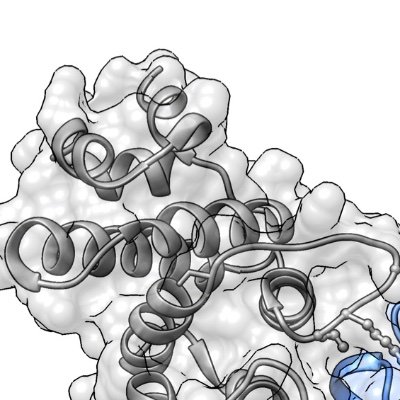
Bode Group
@bode_lab
Followers
4K
Following
472
Media
19
Statuses
173
new reactions, chemical biology, the future of organic synthesis
Zurich, Switzerland and Nagoya, Japan
Joined March 2019
@matthias_muhar @jakobfarnung @RaHofmann Thanks to amazing collaborators in the Schulman, @MartinJinek , and Jessberger labs. And most of all to Jeff Bode's lab, who has been with this every step of the way. @RapeLab wrote a News and Views that explains our work far better than I ever could.
1
1
7
Very excited to highlight @jcornlab's beautiful work on the E3 ligase SCF-FBXO31, which recognizes chemically damaged proteins. Mutations in FBXO31 cause disease by substrate-rewiring, really cool. Congratulations to all authors! https://t.co/RrmDlym7V6
1
11
45
It's been a lot of fun to learn so much about machine learning from our fellow students and colleagues in @ETH_DCHAB . Thanks to @jlngtz and @CoperetGroup for getting this started, already more than 2 years ago!
Machine learning (ML) is a hot topic in almost every field, but how can expertise be built up in a discipline developing so quickly? Doctoral students @ETH_DCHAB @ETH_en created the student training format "Data & ML lunch". Learn more in the interview👇 https://t.co/yPZGZ2llha
1
1
8
Job Offer: two open positions @ETH_DCHAB Starting date: immediately or upon mutual agreement More info: https://t.co/yjtWML6DZI
#scs #ETH #job #organic #analytical #chemistry #professor #Switzerland
0
19
63
Chemical Synthesis of Secretoglobin 3A2 Covalent Homodimer and Photocaged Monomeric Variants (Jeffrey W. Bode and co-workers) @bode_lab
onlinelibrary.wiley.com
Secretoglobin (SCGB) 3A2 is a small, secreted protein present only in mammals. Despite its unique self-assembly driven by disulfide dimerization and non-covalent oligomerization, current understand...
1
2
8
Predicting Three-Component Reaction Outcomes from 40k Miniaturized Reactant Combinations | ChemRxiv -
0
0
0
Sure glad all *we* did was make 40,000 molecules. The project below sounds like much less fun! Researcher steps on deadly vipers 40,000 times to better predict snakebites | Science | AAAS
science.org
Science chats with João Miguel Alves-Nunes about his risky experimental approach, and how it could help save lives
1
0
3
10/10 See all of this (and more!) in our preprint @ChemRxiv
#MachineLearning #Automation #chemistry Predicting Three-Component Reaction Outcomes from 40k Miniaturized Reactant Combinations | ChemRxiv -
0
7
35
9/10 Taken together, these results show 1) it’s possible to do 50,000 reactions during a PhD and 2) large (but not unreasonably large) training set sizes are highly beneficial for reaction prediction.
1
1
14
8/10 For the far more challenging 2D and 3D reaction predictions, featurization including fingerprints and reaction graphs improve the model performance over combinatorial baselines –once training sets of more than 4000 reactions are in reach.
1
0
6
7/10 Simple one-hot encoding or fingerprint-based approaches accurately predict reaction outcomes for 0D and 1D cases, with the model reaching high predictive ability after training with about 2,000 reactions (0D; 1% of the reaction space, in this case) or 10,000 reactions (1D).
1
0
6
6/10 Using this data, we built ML models to predict the outcome of unknown reactant combinations, including 0D (all reactants seen, but not this combination), 1D (one reactant not in the training data), 2D (two reactants not seen), and 3D (none of the reactants seen) test cases.
1
0
9
5/10 Explore the products made and data here: https://t.co/orcp9Bd3wI
jugoetz.com
Heatmap of the outcome of 40,000 Synthetic Fermentation reactions
1
0
19
4/10 With automated analysis of the reactions, we capture detailed info on a range of products and, ultimately, reaction success or failure. Most reactant combinations afford the expected product, some fail and 10% give an alternative product (it’s organic synthesis after all).
1
0
9
3/10 Requiring only 1 microliter aliquots of the building block solutions (177 in total), the entire library of structurally and stereochemically rich molecules could be produced using just 165 mL of reaction solvent in total, at a rate of ~4,000 reactions per day.
1
3
15
2/10 By combining KAT ligation and chemoselective heteroaryl-forming reactions with acoustic dispensing and LC-HRMS, we automated the synthesis and analysis of 50,000 distinct three-component coupling reactions.
1
0
14
Would you like a data set of 40,000 reactions for evaluating your reactivity prediction models? We made it, so you don’t have to. 1/10
2
60
460
After too many delays, we are delighted to be hosting the 9th Chemical Protein Synthesis meeting in Nagoya, Japan from 2-5 June 2024! Join us there for amazing advances in the synthesis of proteins! #protein #peptides
https://t.co/3EsbPgMTFM
0
9
26
@YamauchiLab @ETH_DCHAB @FMIscience See also this outstanding related work on Ub chain synthesis using a photo protecting group by the Okamoto group at @UTokyo_News_en published recently in @J_A_C_S. https://t.co/tmMDaP1sz2
pubs.acs.org
Heterotypic polyubiquitins are an emerging class of polyubiquitins that have attracted interest because of their potential diversity of structures and physiological functions. There is an increasing...
0
0
8
This works comes from a fantastic collaboration with @YamauchiLab at @ETH_DCHAB and Patrick Matthias at @FMIscience on understanding the role of branched Ub chains in viral infections. For this we need homogenous Ub chains to reconstitute the machinery that uncoats viral capsids.
1
1
7








